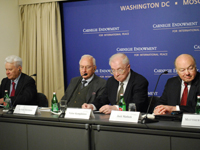Registration
You will receive an email confirming your registration.
Carnegie welcomed former U.S. Ambassadors to Russia, Arthur A. Hartman, Jack F. Matlock, Jr., Thomas R. Pickering, and James F. Collins, and former Russian Ambassadors to the United States, Yuri V. Dubinin and Victor G. Komplektov, to discuss the state of the U.S.-Russian relationship following last year’s reset, the progress made by the resulting Obama-Medvedev Bilateral Presidential Commission, and the challenges and opportunities that lie ahead. The event also launched Indispensable Institutions: The Obama-Medvedev Commission and Five Decades of U.S.-Russia Dialogue, a report by Matthew Rojansky. CNN’s Jill Dougherty moderated.
The Bilateral Presidential Commission (BPC)
- Background. While the BPC is not the first such effort by the United States and Russia to strengthen relations—it follows the Gore-Chernomyrdin Commission and the Bush-Putin Strategic Dialogue—it hopes to become an effective, long-term institution to foster the bilateral relationship. The BPC is Co-Chaired by Presidents Obama and Medvedev, with U.S. Secretary of State Hillary Clinton and Russian Foreign Minister Sergei Lavrov as Coordinators, and senior-level officials from both sides heading each of the seventeen individual working groups.
- Achievements. The BPC has produced positive results in its first year, the panel agreed. Its notable achievements include the signing of the nuclear reduction treaty, New START, and the “123 Agreement” on civilian nuclear cooperation; joint efforts against terrorism and drug trafficking; promoting joint scientific research; and increased interactions among the citizens of the two countries. By promoting cultural exchanges, the Commission has also helped to foster contact between various levels of society in both countries, a positive trend the panel hopes will continue.
- Room for improvement. To remain effective, the BPC must focus on specific goals within the context of individual working groups, the panel said. Such goals would address issues like trade, energy, and agriculture. Even more importantly, the BPC will require enhanced institutional support, with regular, direct communication between both sides on the commission’s goals and progress, as well as oversight of the working groups, to achieve concrete results.
Reflections on the Reset
The panel agreed the reset has improved U.S.-Russia relations following a low point during the 2008 war in Georgia. However, while the two sides have made a solid beginning, much work remains to be done and, in some respects, relations remain fragile. The panel identified several issues of importance:
- New START: The panel identified New START as an issue critical to the U.S.-Russia relationship. Commenting on the uncertainty surrounding the ratification of New START in the Senate after recent U.S. midterm elections, the panel stressed that a failure to ratify the treaty would be a blow to recent progress in U.S.-Russia relations and a significant setback.
- “123 Agreement”: The “123 agreement” on civilian nuclear cooperation has not yet gone into effect, and will likely be resubmitted to Congress in January, following a yearlong hiatus.
- Russia’s accession to the WTO: The bilateral work between the United States and Russia to help Russia join the World Trade Organization (WTO) is moving forward and almost complete, Collins said.
- Visa regime: The visa process on both sides is interfering with the kind of people-to-people exchanges that could help relations progress further, Hartman said, adding that both sides should work together to simplify the process. By facilitating public exchanges between the two countries, a simplified visa regime would also help to address lingering Cold War-era stereotypes and misconceptions, which the panel identified as one of the impediments to the relationship’s progress.
Looking Ahead
The ability of the United States and Russia to cooperate on matters of global importance could affect a wide range of important issues from arms control to climate change, the panel concluded. The speakers expressed hope that the reset will continue to produce results, and that the Bilateral Presidential Commission and the broader U.S.-Russia dialogue that it represents would become an enduring, effective fixture in the relationship.
